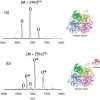Articles
Understanding the role of Se in health using mass spectrometry
Heidi Goenaga-Infante and Mike Sargent
LGC Limited, Queens Road, Teddington, Middlesex TW11 OLY, UK. E-mail: [email protected]
The ICP-ToF mass spectrometer: an alternative for elemental analysis
Erwin Hoffmanna and Christian Lüdkeb
aGOS - Gesellschaft zur Förderung angewandter Optik, Optoelektronik, Quantenelektronik und Spektroskopie eV, Rudower Chaussee 29, 12489 Berlin, Germany. E-mail: [email protected]
bISAS–Institute for Analytical Sciences, Department Berlin, Albert-Einstein-Str. 9, 12489 Berlin, Germany
Unlocking the secrets of ancient glass technology using ToF-SIMS
Frank Rutten,* Julian Hendersona and David Briggs
School of Pharmacy and Centre for Surface Chemical Analysis,
aDepartment of Archaeology, School of Humanities, University of Nottingham, University Park, Nottingham NG7 2RD, UK
*Correspondence to: Frank Rutten, School of Pharmacy, University of Nottingham University Park, Nottingham NG7 2RD, UK. E-mail: [email protected]
Highlight Article: LC-NMR/MS
Steve Down
HD Science Limited, 16 Petworth Avenue, Toton, Nottingham NG9 6JF, UK
Mass spectrometry as a novel tool in protein structural biology
In recent years, the newly-developed soft ionisation techniques together with the possibility to measure masses by high-resolution mass analysers with high transmission and with a broad mass-to-charge range have given mass spec-trometry the opportunity to add complementary information to the protein structural biology community.
Cation mass spectrometry: towards an optimisation of SIMS analyses performed in the MCsx+ mode
T. Wirtz and H.-N. Migeon
Laboratoire d’Analyse des Matériaux, Centre de Recherche Public - Gabriel Lippmann, 162A, av. de la Faïencerie, L-1511 Luxembourg, [email protected]
Glow discharge mass spectrometry in nuclear research
Introduction
Glow Discharge Mass Spectrometry (GDMS) is one of the most powerful solid state analytical methods for the direct determination of traces, impurities and depth profiling of solids.1–5 Glow discharge mass spectrometers, which are commercially available with fast and sensitive electrical ion detection, allow direct trace elemental determination in solid materials with good sensitivity and precision in the concentration range lower than ng g–1.6
Investigating the curing of amino resins with TGA-MS and TGA-FT-IR
Dipl. Chem. FH Ch. Schanzer and Prof. Dr H.G. Bührer
Department of Chemistry, Zurich University of Applied Sciences Winterthur (ZHW), CH-8401 Winterthur, Switzerland

